

These Striking Images Tell the Often Forgotten Story of Asian People in America. Cynthia Trinh has been snapping photographs for a few months shy of a year.
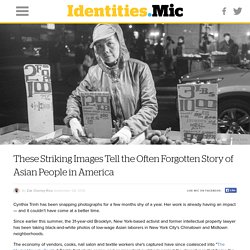
Her work is already having an impact — and it couldn't have come at a better time. Since earlier this summer, the 31-year-old Brooklyn, New York-based activist and former intellectual property lawyer has been taking black-and-white photos of low-wage Asian laborers in New York City's Chinatown and Midtown neighborhoods. The economy of vendors, cooks, nail salon and textile workers she's captured have since coalesced into "The Model Minority Reality," Trinh's first photo series, and an important pushback against the stereotypes that frame the modern Asian-American experience.
"I wanted to do something that really hit home for me, and that I related to," Trinh told Mic. "I started this after the big New York Times nail salon investigation," Trinh said about the photo series. What became clear through that exposé, Trinh said, is that many Asian-American stories are not being told to the general public. Newrepublic. Republican presidential candidates who want to deport undocumented immigrants en masse, end birthright citizenship, and build a wall along the Mexican border just got some new ammunition.

A report released Wednesday by the Center for Immigration Studies, an organization that advocates for reducing immigration to the United States, has concluded that 51 percent of households headed by immigrants—legal or undocumented—receive some kind of welfare. Nine Myths About Immigration The Right Is Dead Wrong About.
When it comes to immigration, the right has shown an excessive amount of intolerance and bigotry.
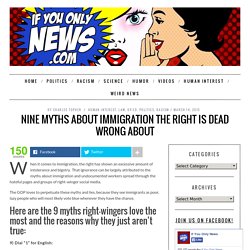
That ignorance can be largely attributed to the myths about immigration and undocumented workers spread through the hateful pages and groups of right-winger social media. The GOP loves to perpetuate these myths and lies, because they see immigrants as poor, lazy people who will most likely vote blue whenever they have the chance. 9) Dial “1” for English: The belief that immigrants refuse to learn English is absolutely absurd. Imagine you decided to move to a foreign country. Immigrants in America face the same issues. While 62% of Americans feel immigrants don’t learn English fast enough, 96% of foreign-born Latinos say it is very important to teach English to the children of immigrant families. 8.) Would you travel hundreds, even thousands of miles, risk arrest, deportation and even death to live in a place you hated? The dream of reaching America is nothing new. 7.) Talk about spin. 6.) 5.) I'll help u pack. Inside America's $2bn immigrant detention industry.
Under President Barack Obama, the US has deported almost two million undocumented immigrants, more than any of his predecessors.
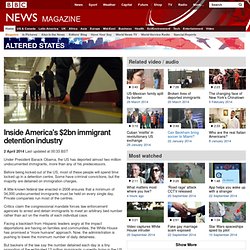
Before being kicked out of the US, most of these people will spend time locked up in a detention centre. Some have criminal convictions, but the majority are detained on immigration charges. A little-known federal law enacted in 2006 ensures that a minimum of 34,000 undocumented immigrants must be held on every single day. Private companies run most of the centres. Critics claim the congressional mandate forces law enforcement agencies to arrest and detain immigrants to meet an arbitrary bed number rather than act on the merits of each individual case. Facing a backlash from Hispanic leaders angry at the impact deportations are having on families and communities, the White House has promised a "more humane" approach. The BBC's Franz Strasser went to Georgia to investigate America's $2bn (£1.2bn) detention and deportation industry.
Seeking a better life. Statue of Liberty. Words from my mouth. Deport racists. Unite. Right of asylum. Asylum seekers by country of origin. 40,000 asylum seekers 30,000 asylum seekers 20,000 asylum seekers 10,000 asylum seekers <10,000 asylum seekers (or no data) The right of asylum (sometimes called political asylum, from the Greek: ἄσυλον)[1] is an ancient juridical concept, under which a person persecuted by his or her own country may be protected by another sovereign authority, a foreign country, or church sanctuaries (as in medieval times).
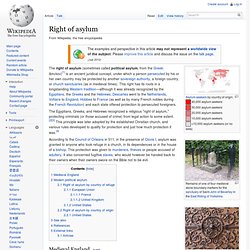
The Egyptians, Greeks, and Hebrews recognized a religious "right of asylum," protecting criminals (or those accused of crime) from legal action to some extent.[2][3] This principle was later adopted by the established Christian church, and various rules developed to qualify for protection and just how much protection it was.[4] The Universal Declaration of Human Rights. Whereas recognition of the inherent dignity and of the equal and inalienable rights of all members of the human family is the foundation of freedom, justice and peace in the world, Whereas disregard and contempt for human rights have resulted in barbarous acts which have outraged the conscience of mankind, and the advent of a world in which human beings shall enjoy freedom of speech and belief and freedom from fear and want has been proclaimed as the highest aspiration of the common people, Whereas it is essential, if man is not to be compelled to have recourse, as a last resort, to rebellion against tyranny and oppression, that human rights should be protected by the rule of law, Whereas it is essential to promote the development of friendly relations between nations, Whereas Member States have pledged themselves to achieve, in co-operation with the United Nations, the promotion of universal respect for and observance of human rights and fundamental freedoms, Article 1.
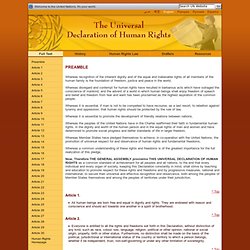
Article 2. Article 3. America Has Always Been a Refuge from Violence. This past weekend's Fourth of July holiday made me nostalgic for the Independence Day celebrations of my childhood.
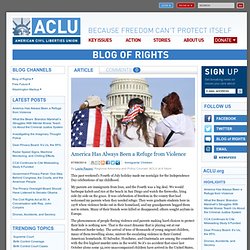
My parents are immigrants from Iran, and the Fourth was a big deal. We would barbeque kabob and rice at the beach in San Diego and watch the fireworks, lying side-by-side on the grass. It was celebration of freedom in the county that had welcomed my parents when they needed refuge. They were graduate students here in 1978 when violence broke out in their homeland, and my grandparents begged them not to return. Many of their friends were killed or disappeared; others sought asylum in Europe. The phenomenon of people fleeing violence and parents making hard choices to protect their kids is nothing new. How we as a country choose to deal with this humanitarian crisis says a lot about our values and who we are as a people.
Go back to your country. Still get food.